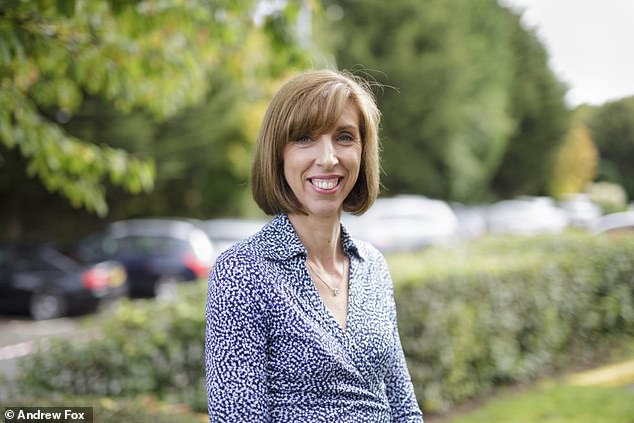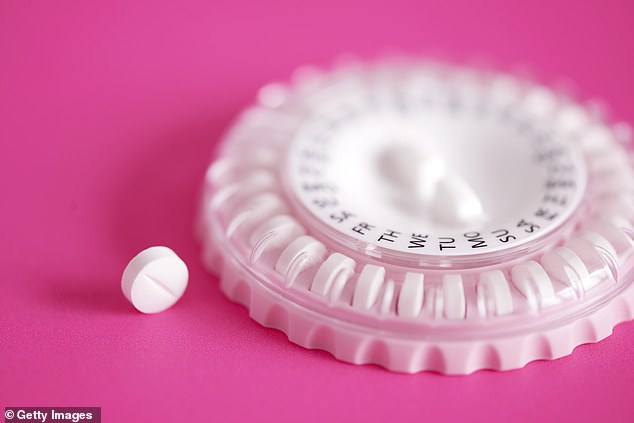Last week’s controversial BBC Panorama episode, The Menopause Industry Uncovered, surprised many.
The first half of the 30-minute film raised concerns about expensive menopause supplements being sold in the UK, despite having no clear benefits.
However, the second part of the documentary was more worrying. Some private menopause doctors are alleged to be putting women’s health at risk by prescribing extremely high doses of HRT. The program focused on one specialist and her clinic in particular: the famous menopause guru, Dr. Louise Newson.
HRT pills can play an important role in combating menopause symptoms
According to Panorama, his private practice, the Newson Clinic, prescribes one in five of his patients doses of HRT well above the recommended limits.
Dr. Newson and her colleagues say these high doses are necessary to manage debilitating symptoms caused by hormonal changes, including hot flashes, sleep disturbance, and mental health problems. But Panorama highlighted 12 cases of women who claimed to have been harmed by the drug.
As a GP interested in women’s health, I am disappointed but not surprised by the revelations.
I will say no more about that specific case, and the hospital watchdog that the Care Quality Commission is now investigating. But I have long been concerned about the over-medicalization of menopause, and a small but vocal group of activists who claim that it is not simply a normal stage in a woman’s life, but a disease or “impairment” that needs treatment.
It’s a topic I touch on in my book, The Science of Menopause, published this week. Because while I understand the theory, I couldn’t disagree with it more.
It cements the idea that we are “broken” and lacking, when menopause is a normal and expected part of aging.
That doesn’t mean I’m against HRT; I’m not.
Women’s lives can be destroyed by the symptoms of menopause. They can ruin careers, lead to relationship breakdowns and divorces, and have a catastrophic impact on mental health. One in ten women considers suicide as a result.
Last week, new data showed that 60,000 women are out of work for an extended period due to menopause symptoms. For many of these patients, HRT can be transformative.
Menopause used to be something that was never talked about. I am grateful that, thanks to celebrities and activists, including Dr. Newson, that has changed.
It means those who suffer are more likely to receive the medical help they need.
But, like many colleagues, I think the pendulum has swung too far. The truth is that not all women need HRT.
The idea that menopause is a disease is not new: it dates back to the 1960s.
A best-selling book published in 1966, called Feminine Forever, by Robert Wilson, described the concept. The British-born, American-based gynecologist claimed that menopause was a hormonal deficiency, which was “curable and totally preventable…just take estrogen.”
HRT, Wilson argued, was not only useful but necessary to free women from the “curse” of estrogen loss. He believed it should be taken for life, not just until the symptoms disappeared.

Dr Louise Newson’s clinic prescribes one in five of her patients doses of HRT well above the recommended limits
“Many doctors,” Wilson wrote, “simply refuse to recognize menopause for what it is: a serious, painful, and often crippling illness.”
For anyone even slightly persuaded by this, he also wrote that with HRT, a woman’s “breasts and genitals will not wrinkle.” She will be much nicer
live with and it will not become boring and unattractive.
Clearly, this is misogynistic nonsense. It plays with the idea that women are valued primarily for their appearance, sexual availability, and ability to bear children.
But surprisingly, the current era of social media has given new life to this terrible concept.
This time it has been rebranded as women taking control of their midlife health in an empowering way. Some of these activists and celebrities promote dodgy supplements and fad diets that are supposed to help menopausal women “turn back the clock.” Others recommend taking testosterone (the “male” sex hormone that women also have in smaller amounts) to increase libido and improve mood, concentration, and sleep.
The British Menopause Society recommends testosterone only to combat low libido, and only in cases where other treatment options have been exhausted.
It has made HRT almost fashionable: the latest anti-aging product.
Like most GPs, I regularly receive requests for HRT from women in their 40s and 50s who do not have any menopausal symptoms.
Midlife can be complicated for women, whether it’s the symptoms of menopause, which can be crippling, or simply the stress of juggling busy careers, teenage children, relationships and sick parents, all on top of the normal aging process.
Some challenges are hormonal and if they are, HRT will help.
But while it may fix some of these symptoms related to hormone levels, it won’t fix everything. And it is vital that women do not have unrealistic expectations about what treatment can achieve.
If you are taking the maximum approved dose of HRT and still have symptoms, the solution may be to look at what else might be causing them and consider adding another treatment, such as antidepressants or psychotherapy, rather than increasing the dose. dose more.
For me, empowerment is not about feeling like you have to do something, but about having a choice about what you do.
Menopause is not the same for everyone. Like any stage of life, each woman will experience it differently.
For some, simple lifestyle changes (a healthier diet and being more active) really help. For the one in four who experience severe and debilitating symptoms, HRT plays an important role. Modern forms, available as gels, sprays and patches, rather than the old pills, are safer than ever.
We have good evidence that, for women who need it and can take HRT, the enormous benefits outweigh the small risk of breast cancer or blood clots.
But there is not enough evidence, unless you have gone through early or surgical menopause, that HRT will protect you against heart disease or dementia, regardless of what you may read on social media.
Statements like these simply provoke fear among women who cannot take HRT because they have a history of breast cancer or other serious health problems.
Instead of being told they are broken or have an illness that needs treatment, women need to know they have options.
I am often asked if I am for or against HRT. It seems like a strange question. Most importantly, I am for what helps my patients, and the solution is not always HRT.
The science of menopause, by Dr Philippa Kaye, is published on Thursday (DK, £16.99).

